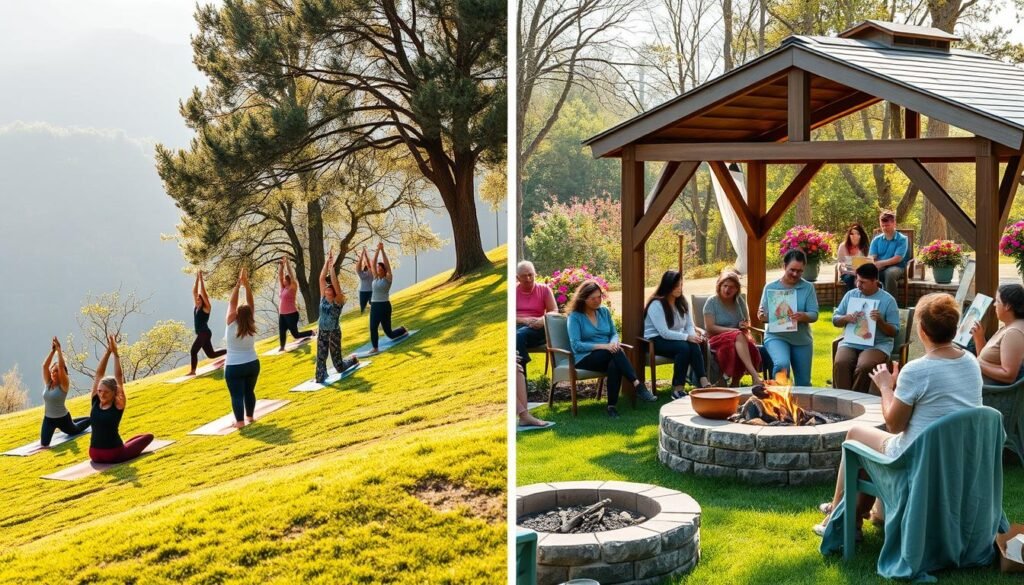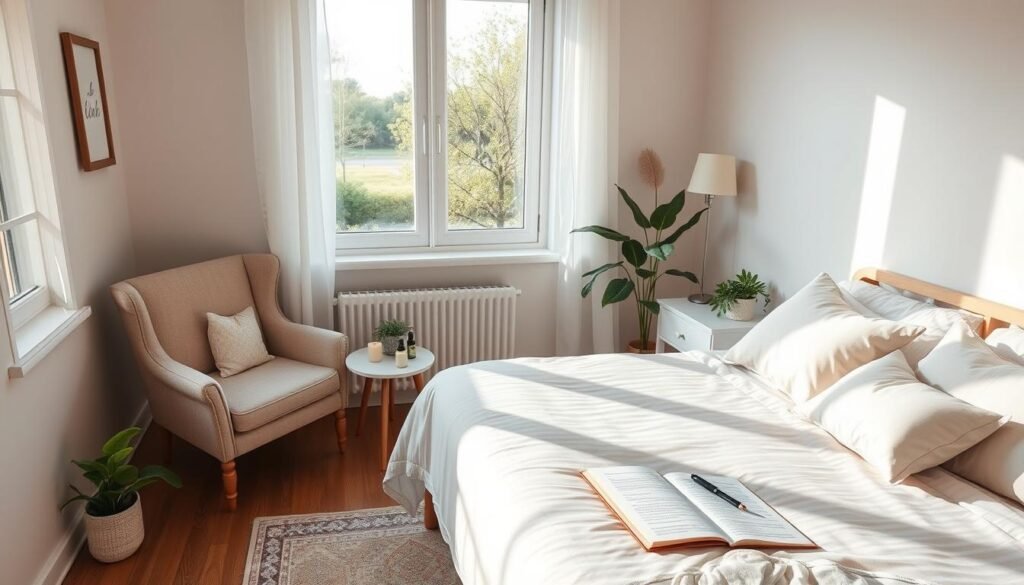Did you know nearly one in five adults in the United States deals with mental illness each year? This fact shows the urgent need for helpful support like depression retreats. These retreats give a calming space where people can focus on taking care of themselves, being mindful, and growing personally.
In today’s world, it’s easy to ignore mental health. That’s why these retreats are so important. They offer a place of healing for those seeking help. With a low ratio of staff to participants, everyone gets the personalized attention they need. This personal touch, combined with holistic practices and nature, aids in recovery.
If you’re facing mental health challenges, a mental health retreat could be a significant step. It can help you find peace and clear your mind.
Key Takeaways
- Depression retreats offer individual attention through a low staff-to-participant ratio.
- Participants experience tranquility in beautiful environments, enhancing their healing journey.
- Adventure-based retreats combine outdoor activities with therapy for personal growth.
- Considering personal goals and budget is vital in choosing the right retreat.
- Project Odyssey is a leading program providing free mental health retreats for veterans.
- Retreat experiences vary in length, catering to different needs and preferences.
Understanding Depression and Its Impact
Depression is a common mental health issue in the United States. Around 16.2 million adults in the U.S. face depression. This equals about 6.7% of the adult population. Knowing the symptoms can help in recognizing and treating it early.
Common Symptoms of Depression
Depression symptoms can vary but often include:
- Persistent feelings of sadness
- Loss of interest in once-loved activities
- Feeling very tired or having low energy
- Seeing changes in appetite or weight
- Having a hard time focusing
- Thinking about suicide
These symptoms affect both feelings and daily life. They can hurt relationships and work performance, pointing to the need for professional help. To understand depression better, look at reliable information, such as this resource.
How Depression Affects Daily Life
Depression does more than change mood. It makes daily tasks hard, affecting jobs, friendships, and home life. It’s a big reason for disability in those aged 15 to 44 in richer countries.
Depression also brings social challenges. Men are less likely to seek help than women, with only a third getting outpatient treatment for depression. The stigma around mental health can stop many from getting the help they need. Recognizing various types, like Major Depressive Disorder or Seasonal Affective Disorder, reveals depression’s broad impact.
The Benefits of Attending a Depression Retreat
Going to a depression retreat can change your life. People find it helps them heal and move forward. These retreats focus on self-care, getting help from experts, and growing personally.
Focus on Self-Care and Mindfulness
Taking care of yourself is key to getting better. Retreats offer practices like meditation and yoga to lessen stress. They teach mindfulness, helping you tune into your emotions for better health.
Access to Professional Support and Guidance
Depression retreats give you access to expert help. You get advice from therapists who know all about depression. This support helps you handle your feelings and find ways to cope that work for you.
Opportunities for Personal Growth and Healing
Retreats offer chances for growth and healing. By taking part in therapeutic activities, you can work through your emotions. You grow stronger and learn to understand yourself better. Going home, you’ll have new insights and tools to support your healing path.
| Benefit | Description |
|---|---|
| Self-Care Practices | Meditation, yoga, and wellness activities to promote emotional health. |
| Professionally Guided Support | Access to therapists specializing in various types of depression. |
| Personal Growth | Opportunities to engage in activities that foster emotional resilience and coping skills. |
What to Expect at a Depression Retreat
A depression retreat is a special chance to heal and grow. There, you will find many activities aimed at improving how you feel inside and out. You’ll get to try different workshops and outdoor activities. They are all about helping you relax and learn more about yourself.
Therapeutic Activities and Workshops
Therapeutic workshops are key at these retreats. They help you connect with yourself and others. You’ll join in on:
- Group therapy discussions
- Yoga and meditation classes
- Mindfulness exercises
- Creative therapies such as art and music
This safe space lets you share feelings and learn how to cope better. They help you gain personal insights and start to heal.
Time Spent in Nature
Being in nature has proven health benefits. At retreats, you might go hiking. Activities like this can boost your mood and cut down stress. Retreat locations are usually peaceful and quiet. This setting adds to the healing process, helping you feel more at peace.
Meal and Nutrition Planning
What you eat affects your mood. Retreats often focus on this by planning meals that are nutritious and balanced. You’ll eat foods that not only taste good but also make you feel better emotionally. Some retreats also teach cooking classes. This helps you keep up with healthy eating when you go home.

Types of Depression Retreats Available
There are many types of depression retreats designed to help different needs and likes. These places offer a safe space that helps people heal and grow.
Holistic and Wellness Retreats
Holistic retreats focus on taking care of both mind and body. They offer activities like yoga, meditation, and advice on eating well. The goal is to help people find balance and get better in a supportive setting.
One example is Alta Loma in Georgetown, Texas, which provides personalized care for serious mental health issues.
Spiritual and Mindfulness Retreats
Spiritual retreats help people look inward and grow through mindfulness. They take part in practices that help them find meaning and connect to something bigger. These experiences lead to better understanding of their challenges and help them on their road to recovery.
Therapy Retreats Focused on Group Support
Therapy retreats stress the power of community. People dealing with similar problems can make strong bonds, helping each other. This type goes beyond treatment methods. It offers a feeling of belonging that can change lives.
Places like The Sanctuary at Sedona use new treatment methods. They combine cognitive behavioral therapy with holistic approaches. This helps achieve deep healing within a supportive group.

To learn more about how depression retreats can aid mental health, check out trusted articles on their benefits.
Preparing for Your Experience at a Depression Retreat
Getting ready is key to benefiting from a depression retreat. Make a plan before you go. This helps you stay focused and eager to start healing. You should set personal goals, know what to pack, and get your mind positive.
Setting Personal Goals
Goals give you a clear path at the retreat. Think about what you want to achieve there. You might want to learn how to handle stress better, find ways to ease anxiety, or explore your inner self. Thinking about these aims before you go can really improve your stay. It keeps you on track.
What to Bring and Expect
What you pack for the retreat matters. Bring things that make you feel at ease, like your favorite book or journal. It’s also smart to know what the retreat offers. This tells you what activities they have and what you’ll find there. It makes settling in easier.
Mindset Preparation
Your attitude affects your retreat experience a lot. Being positive and open can change how you see the activities. Try to be ready to join in and grow. This attitude makes you more open to change and brings new ideas into your life.

Finding the Right Depression Retreat for You
Finding the right depression retreat helps significantly in your mental health journey. It’s important to pick a place that meets your needs. Make sure to research well to find a place that resonates with your personal healing goals.
Researching Locations and Programs
Start by looking into where the retreat is and what programs they offer. Think about:
- Reputation of the facility
- Types of therapies offered, such as cognitive behavioral therapy (CBT) and mindfulness practices
- Location and accessibility of the retreat
- Reviews and testimonials from past participants
Gathering this information helps you make the right choice for your needs. It leads to a more effective healing process.
Considering Professional Qualifications
Check the qualifications of the people running the programs. Look into:
- Checking credentials of therapists and facilitators
- Determining their experience with depression and specific treatment modalities
- Understanding the staff-to-participant ratio for personalized care
Being confident in their skills is key for a good experience in overcoming your struggles.
Budgeting for Your Retreat Experience
Thinking about costs is very important. Remember to include:
- Travel costs to and from the location
- Accommodation if the retreat does not provide it
- Potential hidden fees for extra services or activities
Plan your budget carefully. This way, you can take care of your mental health without worrying about money. Smart planning allows you to focus on getting better.
The Role of Community in Recovery
Finding a supportive community is key in overcoming depression. During a depression retreat, people form bonds that help them heal. These bonds grow into a caring community, improving resilience and dedication to well-being.
The Importance of Shared Experiences
When people share their stories, empathy and understanding grow. They discover their struggles are similar, creating a bond. This sense of not being alone aids recovery. Activities that emphasize shared stories strengthen the healing process.
Building Support Networks
Creating strong support networks is essential for recovery. Friendships formed at retreats offer encouragement and hold people accountable. These connections provide resources, involve individuals in community events, and keep them in touch with peers, which boosts their recovery path. Whether through groups like AA or NA, or online communities, these networks promote sobriety and meaningful connections.
Post-Retreat Strategies for Continued Care
Coming back to regular life after a retreat for depression is very important. It’s crucial to keep using what you learned at the retreat in your day-to-day life. Doing this helps people keep their mental health in check.
Integrating Lessons Learned into Daily Life
After the retreat, making a plan to use what you learned every day is key. This might mean doing daily things that take care of you. Some of these are:
- Mindfulness meditation to help be more aware and present.
- Journaling to think about your thoughts and feelings often.
- Setting personal goals for your mental health.
Having a clear plan for using these lessons can really help you feel better overall. You can go back to the resources and materials from the retreat, like suggested readings, to keep yourself on track.
Maintaining Connections with Other Participants
Keeping in touch with people you met at the retreat is also important. These connections can give you support as you work on your mental health. Here are some ways to stay connected:
- Say thank you through email soon after the retreat to keep the connection alive.
- Plan another get-together soon to keep supporting each other.
- Use social media groups or hashtags for sharing updates and tips.
By keeping these connections strong, everyone can help each other more. This also helps bring new people into the healing experience retreats provide.
Conclusion
Depression retreats have a powerful effect on helping people heal mentally. They offer a caring environment that promotes self-care, bond with others, and personal growth. At these retreats, individuals learn how to deal with their challenges and gain deep insights.
Depression has many forms, including Major Depressive Disorder and Seasonal Affective Disorder. Retreats are great because they offer care that meets everyone’s unique needs. This specialized support helps people manage their mental health better.
By choosing depression retreats, people make a big step towards healing. To discover how these retreats aid in healing, visit beneficial options. It’s a crucial step towards wellbeing and starting anew.